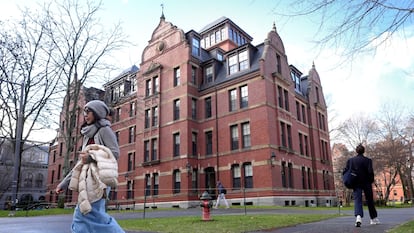Trump vs. Harvard: Six keys to the attack on America’s academic symbol
The latest measure affects around 6,800 students, 27% of the total at the country’s most prestigious institution, which the Republican administration wants to bend to its will


The bombshell came in the form of a letter. Department of Homeland Security (DHS) Secretary Kristi Noem wrote to Harvard University academic officials on Thursday to inform them that the Donald Trump administration was revoking their authority to enroll international students.
The move escalates the White House’s ongoing harassment of the oldest and wealthiest institution of higher education in the United States, accusing it of inciting “antisemitism” and “terrorism” on its campus. To subdue the university, Washington officials have already frozen nearly $2.7 billion in federal funds and are threatening to rescind its tax-exempt status.
The latest measure has shocked faculty and students at the prestigious university. Below is a series of questions and answers about an unprecedented attack on academic freedom at an icon of the Ivy League.
Who is affected?
The announcement affects Harvard University’s Student and Exchange Visitor Program (SEVP), which will no longer be able to enroll new international students. Those already enrolled in the program are being urged by the DHS to transfer to another university or risk losing their legal status in the country.
According to the institution’s own enrollment figures, there are approximately 6,800 international students at Harvard, roughly 27% of the student body. This figure has grown enormously (and is directly proportional to the high tuition that these students pay, if they don’t receive scholarships): they have increased by 19.7% since 2010.
When does the ban go into effect?
In the letter, Noem said it was effective immediately. “Harvard can no longer enroll foreign students, and existing foreign students must transfer or lose their legal status,” the DHS said in a news release on Thursday.
The measure is understood to affect the 2025/2026 academic year, following a threat made in April, the month in which classes ended for this year. It is unclear to what extent the summer course plans will change, which, as one of the teachers clarified this Thursday, are “largely” attended by international students.
What does Noem want?
Thursday’s letter follows the back-and-forth between Harvard and the DHS in recent weeks. The department requested confidential information from the university about its international students. “This administration is holding Harvard accountable for fostering violence, antisemitism, and coordinating with the Chinese Communist Party on its campus,” Noem writes in her statement. “It is a privilege, not a right, for universities to enroll foreign students and benefit from their higher tuition payments to help pad their multibillion-dollar endowments.”
Trump’s administration secretary is offering Harvard a way out and to regain SEVP certification, giving it “72 hours” to provide authorities with the information they’re requesting, including video or audio recordings that could be used to identify individuals who participated in protests on the university’s campus in Cambridge in the last five years.
How has Harvard reacted?
With a statement. Shortly after Trump’s latest attack became known, a spokesman named James Newton said it was “retaliatory” and “unlawful.”
“We are fully committed to maintaining Harvard’s ability to host international students and scholars, who hail from more than 140 countries and enrich the University — and this nation — immeasurably,” Newton said. “This retaliatory action threatens serious harm to the Harvard community and our country, and undermines Harvard’s academic and research mission.”
Can the government do something like this?
It’s doubtful. Granting the visas that students need to pursue their studies falls under the jurisdiction of U.S. immigration authorities, so they could refuse to grant them to Harvard applicants. What raises even more doubts is whether they could do so without considering each case individually, raising concerns that lawsuits will arise, as has already happened with dozens of other executive actions adopted by the Trump administration.
And now what?
Several legal analysts are confident that Harvard will use those 72 hours to obtain an injunction to temporarily stop the revocation from going into effect. The university already did so last month to oppose the government’s attempts to curtail its academic freedom.
The prestigious institution’s resilience to Trump’s attacks, thanks in part to its extremely healthy financial system, has become a symbol and stands in contrast with the earlier capitulation of Columbia University in New York. “The Department is already arresting and seeking to deport students for engaging in protected political activity it disfavors,” warns Will Creeley, legal director at the Foundation for Individual Rights and Expression (FIRE), in another statement. “Were Harvard to capitulate to Secretary Noem’s unlawful demands, more students could face such consequences. The administration’s demand for a surveillance state at Harvard is anathema to American freedom.”
Sign up for our weekly newsletter to get more English-language news coverage from EL PAÍS USA Edition
Tu suscripción se está usando en otro dispositivo
¿Quieres añadir otro usuario a tu suscripción?
Si continúas leyendo en este dispositivo, no se podrá leer en el otro.
FlechaTu suscripción se está usando en otro dispositivo y solo puedes acceder a EL PAÍS desde un dispositivo a la vez.
Si quieres compartir tu cuenta, cambia tu suscripción a la modalidad Premium, así podrás añadir otro usuario. Cada uno accederá con su propia cuenta de email, lo que os permitirá personalizar vuestra experiencia en EL PAÍS.
¿Tienes una suscripción de empresa? Accede aquí para contratar más cuentas.
En el caso de no saber quién está usando tu cuenta, te recomendamos cambiar tu contraseña aquí.
Si decides continuar compartiendo tu cuenta, este mensaje se mostrará en tu dispositivo y en el de la otra persona que está usando tu cuenta de forma indefinida, afectando a tu experiencia de lectura. Puedes consultar aquí los términos y condiciones de la suscripción digital.








































